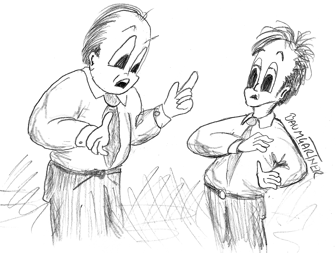Motivate Your Team to Be More Creative with the Three Cs
During the monthly sales meeting, Arnold, a new Business Development Executive and something of a gadget freak suggested: “you know those hand-held devices the delivery people at UPS use to confirm receipt of your parcel? Wouldn't it be cool if we had a device like that so we could take clients' orders immediately and send them to production people? It would make it so much easier to make orders, there would be fewer mistakes and production could begin sooner!”
Steven, the Sales Manager smiled. He was used to outrageous ideas from the sales people. “Do you have any idea how much it would cost to equip the entire sales team with gadgets like that? Not to mention install the infrastructure for taking orders!?”
 In less than a minute, Steven has not only rejected Arnold's idea, but
has also ridiculed it in public. Steven has sent a very clear message
to Arnold and his colleagues: this sales manager is not open to new ideas.
In less than a minute, Steven has not only rejected Arnold's idea, but
has also ridiculed it in public. Steven has sent a very clear message
to Arnold and his colleagues: this sales manager is not open to new ideas.
Yet, the scene described is highly commonplace and almost every creative thinker who has been employed in a medium to large firm has doubtless experienced it. Many of us, if pushed, will even shamefacedly admit to having been in Steven's place
Ironically, people like Steven work in companies that describe themselves as innovative and people like Steven often believe they are supportive of creative thinkers. But a couple of criticisms like the one described and the salespeople will be well trained to keep their creative ideas to themselves. So much for creativity and innovation!
How might Steven have handled the same situation better – and been more receptive to ideas? He could use an approach I call the “Three Cs”: Consider, Compliment, Challenge.
First C: Consider
In the example, Steven did not really stop to think about the idea suggested by Arnold. He gave it a quick analysis, found a flaw and rejected the idea. Such thinking, I believe, is partly the result of too many managers going through MBA courses which train students to be overly analytical and risk averse.
But analysing is not the same as considering an idea. The latter involves envisioning the implementation of the idea and how it might work. Analysing is more of a score-sheet which gives a pass-fail mark. And if it fails, it fails.
Second C: Compliment
Compliments are wonderful things! I try to use them all the time. Compliments make people feel good about themselves and what they are doing. Compliments motivate people to continue to be deserving of the compliment. As a manager, I prefer people to act in the hope of being complimented rather than in fear of being criticised.
Having considered the idea, the manager should compliment it. Ideally, the consideration will generate the compliment. In the case above, “I'm glad you are looking at ways to make the sales process more efficient” would be a good, relevant compliment. But, if nothing else, saying: “that's a good idea.” or “it's good you are thinking creatively” are useful standbys.
Third C: Challenge
Having considered an idea and complimented it, the final step is for the manager to challenge the idea suggester to improve the idea. In particular, the manager should look at the issue that wants to trigger criticism. In the example above, it would be the cost of implementing the idea. Then twist that problem into a creative challenge.
In Steven's case, a far more effective response would be to think for a moment and then say: “Thanks, Arnold. That's a terrific idea and I especially like the fact you are looking at ways to streamline the ordering process. But, the cost of custom making hand-held devices for a relatively small team like ours would probably be way too high. Can you think of ways we might accomplish the same thing but with a reasonable budget?”
In this second scenario, Steven has complimented Arnold in front of his colleagues, has indicated to everyone in the meeting that he is open to ideas and has challenged Arnold to think about his idea in more detail and solve problems that might prevent its implementation.
In a group environment, the Sales Manager might even invite everyone in the room to think about the challenge. And by starting the discussion on a positive note, the manager encourages team members also to take a more positive approach.
Of course, Arnold might find that there is not a viable solution or he may simply not be motivated enough about the idea to take it further. But even if that is the case, he has been motivated to continue being creative. And that is critical for companies that claim to be innnovative.
The Three-Cs is a simple, yet remarkably powerful method of establishing an innovation friendly environment in any organisation. Indeed, I have over the years delivered this as a short workshop or a component of a larger training event on several occasions – and the results have always been impressive.
Consider Manager Training (self-promotion)
Would your company benefit from training managers to not only think more creatively, but also to motivate their teams to be more creative? If so, let me design a workshop especially for your managers. After a one day workshop, they will better understand the creative process, they will have creative tools they can use to think more creatively and they will be able to push their teams to be more creative; all of which leads to more innovation.
Interested? Get in touch and let's talk about your company, your managers and innovation. I'm waiting for your call (+32 2 305 65 91) or email (jeffrey@creativejeffrey.com) or use the form.
© 2008,2010, 2017 Jeffrey Baumgartner




